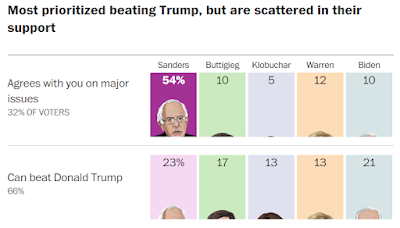He's compelling the federal government to focus primarily on downplaying whatever might embarrass him. He's minimizing the risks. There are reports that patients at risk aren't being tested:
One man has locked himself in his Brooklyn apartment, trying to get by with a hacking cough and a fever - and a real concern he is infected with the novel coronavirus....Trump wants you to believe that everything's under control, and that America will largely avoid outbreaks. He's crossing his fingers and hoping the virus's spread will abate in the spring.
The man, who will go by 'John' by anonymity, recently spent five days in Tokyo on business. When he returned home this week, he just knew he had a problem.
At NYU Brooklyn [hospital], they put him in isolation, and ran a battery of tests for other things - all negative. Then, per protocol, they called the CDC, because NYU Suspect COVID-19, but the CDC said no.
The CDC says they thought he wasn't sick enough - even though public health experts say most coronavirus cases are more minor, and it flies in the face of what the CDC said on a press call on Friday.
But I hope he's right. I want him to get away with this because the damage a botched epidemic could do to his poll numbers isn't worth the risk to Americans' health and the profound disruption they'll experience in their lives. As Michael Hiltzik of the Los Angeles Times makes clear, if we have a full-blown epidemic here, many Americans won't be able to take care of themselves or their loved ones:
A huge proportion of American workers simply don’t have the economic power to stay home, whether to care for family members or even to give themselves a chance to recover from a viral infection in solitude, or the legal right to take off from work without losing their jobs or pay....And as The New York Times reports:
About two-thirds of all workers have access to health benefits at work, but that’s overstating things. Because the cost of premiums can be more than they can afford, only about half of eligible workers actually sign up for coverage. And when they do, many still face daunting deductibles or co-pays that keep them from seeking care.
... health coverage [is] unattainable for low-income workers. That’s the case for Amparo Ramirez, 48, who works in the cold food facility of the airline catering service LSG Sky Chefs at LAX, where she earns the minimum wage of $15.25 an hour, preparing meals for airline passengers. Ramirez says she can’t afford premiums for the company’s health plan to cover herself and her two daughters.
“Even my co-workers who have the coverage say they have to use half their paychecks to get care,” she told me. Instead, she sometimes drives to Tijuana to obtain low-cost treatment or medicines....
Ramirez says she’s been working although she has been suffering from a form of bronchitis for three months. Her employer would grant her up to two days of sick leave, but after that she would need to produce a doctor’s note — something she can’t get because she can’t afford to see a doctor.
Around the nation, school officials and parents were flummoxed by the sudden warning that if a coronavirus epidemic hit the United States, school buildings could be shut down for long periods of time, leaving children sequestered at home....I want Trump gone, but I hope defeating him doesn't require this.
The obstacles to teaching remotely were evident: American children have uneven access to home computers and broadband internet. Schools have limited expertise in providing instruction online on a large scale. And parents would be forced to juggle their own work responsibilities with what could amount to “a vast unplanned experiment in mass home-schooling,” said Kevin Carey, vice president for education policy at New America, a think tank....
Dennis Kosuth, a nurse for Chicago Public Schools, said his district’s ability to handle an outbreak could be compromised by circumstances like families who could not afford child care costs to keep sick children at home. Nursing shortages are a concern, too, he said. Mr. Kosuth said he was responsible for nursing care at four schools.
Some Chicago schools also lack rooms dedicated to health needs, Mr. Kosuth said. In one school where many students and staff members became ill with an ordinary infection last semester, “Patient Zero was sitting in the main office coughing and sneezing all over the place” as the sick child waited to be picked up, he said.





